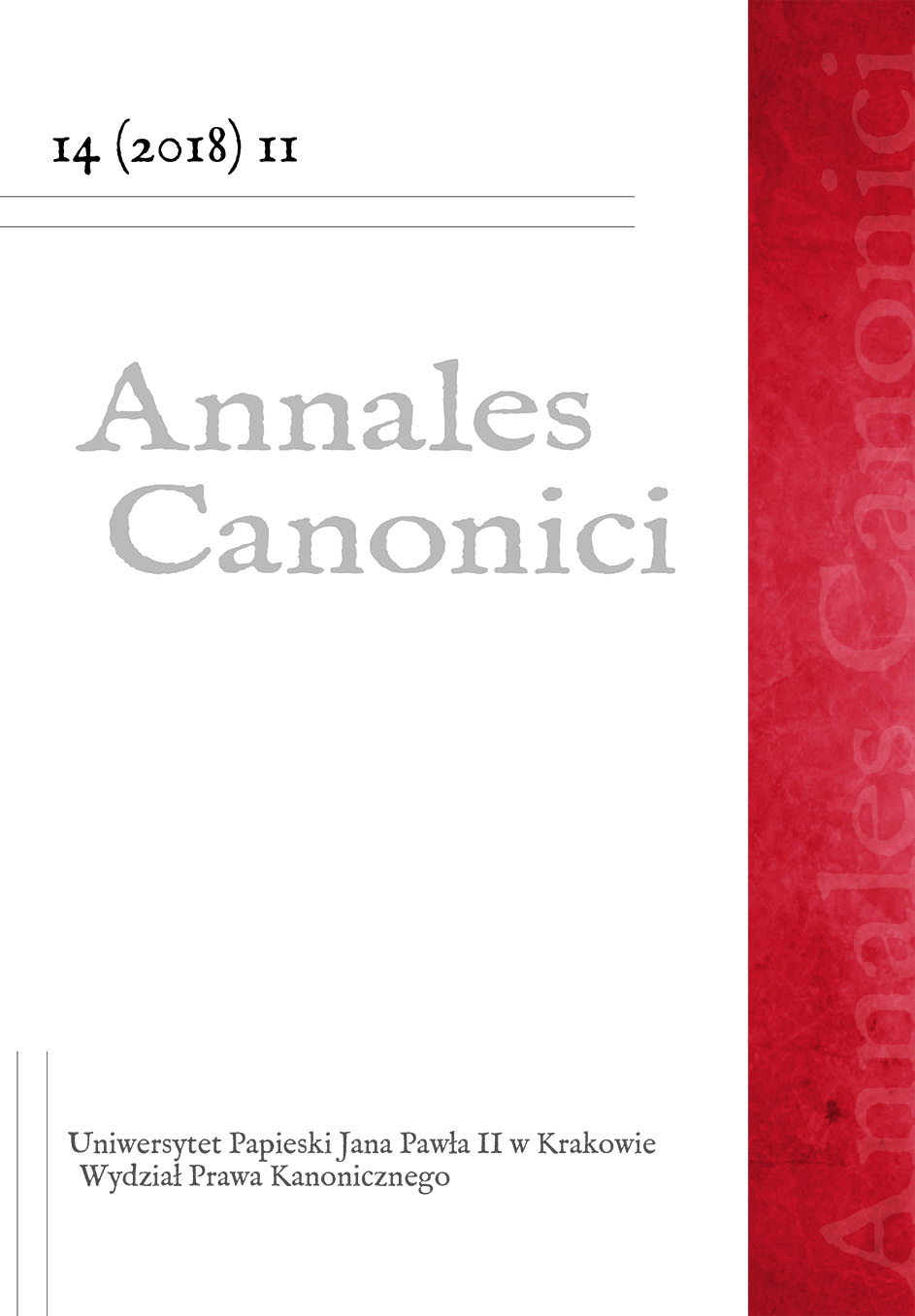Znaczenie preambuły do konkordatu z 1993 roku dla interpretatora
DOI:
https://doi.org/10.15633/acan.2776Słowa kluczowe:
konkordat 1993, Stolica Apostolska, Rzeczpospolita Polska, preambuła, wykładnia prawa, prawo międzynarodoweAbstrakt
Konkordat między Stolicą Apostolską a Rzecząpospolitą Polską z 1993 roku zawiera preambułę. Celem niniejszego artykułu jest odpowiedź na pytanie, czy w konkretnym przypadku polskiego konkordatu ogólna zasada, zgodnie z którą preambuła pomaga w interpretacji, się sprawdza. W celu omówienia tego zagadnienia przeanalizowano kilka kwestii, które odnoszą się głównie do treści preambuły. Wniosek jest niejednoznaczny. Preambuła, o której mowa, może być pomocna w wyjaśnieniu znaczenia postanowień podstawowej części konkordatu. Jednakże ze względu na braki redakcyjne lub niejasne sformułowania w preambule może ona utrudnić proces interpretacji.Bibliografia
Bierzanek R., Symonides J., Prawo międzynarodowe publiczne, Warszawa 2005.
Codex Canonum Ecclesiarum Orientalium auctoritate Ioannis Pauli PP. II promulgatus, 18.10.1990, „Acta Apostolicae Sedis” 82 (1990), s. 1045–1353; tekst łacińsko-polski: Codex Canonum Ecclesiarum Orientalium auctoritate Ioannis Pauli PP. II promulgatus, Kodeks kanonów Kościołów wschodnich. Promulgowany przez papieża Jana Pawła II, wydanie łacińsko-polskie, Lublin 2002.
Codex Iuris Canonici auctoritate Ioannis Pauli PP. II promulgatus, 25.01.1983, „Acta Apostolicae Sedis” 75 (1983) pars II, s. 1–301; tekst łacińsko-polski: Kodeks prawa kanonicznego, przekład zatwierdzony przez Konferencję Episkopatu Polski, Poznań 1984.
Ehrlich L., Interpretacja traktatów, Warszawa 1957.
Główny Urząd Statystyczny, Wyznania religijne, stowarzyszenia narodowościowe i etniczne w Polsce 2009–2011, Warszawa 2013.
Góralczyk W., Sawicki S., Prawo międzynarodowe publiczne w zarysie, Warszawa 2009.
Joannes Paulus PP. II, Apostolicis Litteris Totus Tuus Poloniae populus nova Polonicarum circumscriptionum ecclesiasticarum compositio, „Acta Apostolicae Sedis” 84 (1992), s. 1099–1112; tekst polski: http://episkopat.pl/bulla-totus-tuus-poloniae-populas (27.03.2017).
Jamróz A., Kilka uwag o wartości normatywnej preambuł konstytucyjnych, w: Prawo. Administracja. Obywatele. Profesorowi Eugeniuszowi Smoktunowiczowi, Białystok 1997, s. 103–109.
Katechizm Kościoła Katolickiego, Poznań 1994.
Konkordat między Stolicą Apostolską i Rzecząpospolitą Polską (Dz.U. z 1998 r. Nr 51, poz. 318).
Konwencja o ochronie praw człowieka i podstawowych wolności z dnia 4 listopada 1950 r. (Dz.U. z 1993 r. Nr 61, poz. 284).
Konwencja wiedeńska o prawie traktatów, sporządzona w Wiedniu dnia 23 maja 1969 r. (Dz.U. z 1990 r. Nr 74, poz. 439).
Kozłowski A., Interpretacja traktatu międzynarodowego w świetle jego kontekstu, Warszawa 2002.
Kroczek P., Co prawodawca miał na myśli? – czyli czym jest „mens legislatoris” i gdzie jej szukać?, „Annales Canonici” 3 (2007), s. 187–198.
Kroczek P., Skonieczny P., Preamble of Law: Perspective of Legislator and Interpreter, „Angelicum” 90 (2013) fasc. 4, s. 869–888.
Kroczek P., The Art of Legislation: the Principles of Lawgiving in the Church, Kraków 2012.
Kroczek P., Prawny wymiar troski Kościoła o rozwój człowieka i społeczeństwa, w: Rozwój i dobro wspólne. Dyskurs w 25-lecie encykliki „Sollicitudo rei socialis” Jana Pawła II, red. J. Mazur, Kraków 2012, s. 71–87.
Krukowski J., Konkordat polski. Znaczenie i realizacja, Lublin 1999.
Krukowski J., Konkordaty współczesne. Doktryna. Teksty (1964–1994), Warszawa 1995.
Krukowski J., Sobański R., Komentarz do Kodeksu Prawa Kanonicznego, t. 1, Księga I, Normy ogólne, Poznań 2003.
Lewandowski S., Charakter normatywny preambuły, „Studia Iuridica” 36 (1998), s. 113–136.
Międzynarodowy pakt praw obywatelskich i politycznych otwarty do podpisu w Nowym Jorku dnia 19 grudnia 1966 r. (Dz.U. z 1977 r. Nr 38, poz. 167).
Mik C., Metodologia interpretacji traktatów z dziedziny ochrony praw człowieka, „Toruński Rocznik Praw Człowieka i Pokoju” (1993) z. 1, s. 11–35.
Morawski L., Zasady wykładni prawa, Toruń 2010.
Orzeczenie Sądu Najwyższego z dnia 12 maja 1928 r. (I C 592/26), LEX nr 917828..
Pawluk T., Prawo Kanoniczne według Kodeksu Jana Pawła II, t. 1, Olsztyn 1985.
Rozporządzenie Prezesa Rady Ministrów z dnia 20 czerwca 2002 r. w sprawie „Zasad techniki prawodawczej” (tekst jedn. Dz.U. z 2016 r. poz. 283).
Sacrosanctum Concilium Oecumenicum Vaticanum II, Constitutio dogmatica Lumen gentium de Ecclesia, 21.11.1964, „Acta Apostolicae Sedis” 57 (1965), s. 5–75; tekst łacińsko-polski: Sobór Watykański II, Konstytucja dogmatyczna o Kościele Lumen gentium, w: Sobór Watykański II, Konstytucje, dekrety, deklaracje, Poznań 2008, s. 144–263.
Sacrosanctum Concilium Oecumenicum Vaticanum II, Constitutio pastoralis Gaudium et spes de Ecclesia in mundo huius temporis, 7.12.1965, „Acta Apostolicae Sedis” 58 (1966), s. 1025–1115; tekst łacińsko-polski: Sobór Watykański II, Konstytucja duszpasterska o Kościele w świecie współczesnym Gaudium et spes, w: Sobór Watykański II, Konstytucje, dekrety, deklaracje, Poznań 2008, s. 824–981.
Sacrosanctum Concilium Oecumnicum Vaticanum II, Declaratio Dignitatis humanae de libertate religiosa, 7.12.1965, „Acta Apostolicae Sedis” 58 (1966), s. 929–941; tekst łacińsko-polski: Sobór Watykański II, Deklaracja Dignitatis humanae o wolności religijnej, w: Sobór Watykański II, Konstytucje, dekrety, deklaracje, Poznań 2008, s. 638–661.
Stefaniuk M., Preambuła Aktu Normatywnego. W doktrynie oraz procesie stanowienia i stosowania polskiego prawa w latach 1989–2007, Lublin 2007.
Układ pomiędzy Stolicą Apostolską i Argentyną z dnia 10.10.1966, „Acta Apostolicae Sedis” 59 (1967), s. 127–130.
Konkordat między Stolicą Apostolską i Republiką Kolumbii z dnia 12.07.1973 r., „Acta Apostolicae Sedis” 67 (1975), s. 421–434.
Ustawa z dnia 7 października 1999 r. o języku polskim (tekst jedn. Dz.U. z 2011 r. Nr 43, poz. 224 z późn. zm.).
Wyrok Trybunał Konstytucyjnego z dnia 11 maja 2005 r. (K 18/04), (Dz.U. z 2005 r. Nr 86, poz. 744).
Wyroku Trybunału Konstytucyjnego z dnia 11 maja 2007 r. (K 2/07), (Dz.U. z 2007 r. Nr 85, poz. 571).
Wyrozumska A., Umowy międzynarodowe. Teoria i praktyka, Warszawa 2006.
Zamkowski W., Konstytucja okołokonkordatowa [1], http://www.racjonalista.pl/kk.php/s,3017 (21.03.2018).
Zieliński M., Wykładnia prawa. Zasady. Reguły. Wskazówki, Warszawa 2002.
Pobrania
Opublikowane
Numer
Dział
Licencja
Prawa autorskie (c) 2019 Piotr Kroczek

Utwór dostępny jest na licencji Creative Commons Uznanie autorstwa 4.0 Międzynarodowe.
Autorzy publikujący w czasopiśmie udzielają jego wydawcy zgody o następującej treści:
- Autor zachowuje autorskie prawa majątkowe do utworu, a jednocześnie udziela wydawcy czasopisma zgody na jego pierwszą publikację w wersji drukowanej i wersji online na licencji Creative Commons Uznanie autorstwa 4.0 Międzynarodowe oraz zgody na wykonywanie opracowań, w tym przekładów.
- Autor ma możliwość udzielania zgody niewyłącznej na opublikowanie utworu w wersji, która ukazała się w czasopiśmie (np. zamieszczenia go w repozytorium instytucjonalnym lub opublikowania w książce), wraz z informacją o jego pierwszej publikacji w czasopiśmie.
- Autor może umieścić swój utwór online (np. w repozytorium instytucjonalnym lub na swojej stronie internetowej) jeszcze przed zgłoszeniem utworu do czasopisma.

